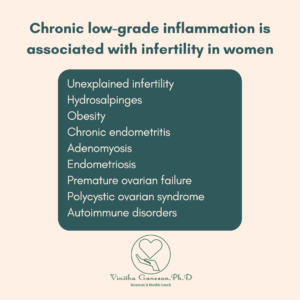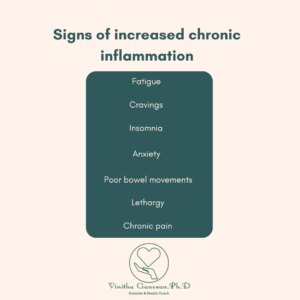Inflammation as such isn’t bad, it’s good for you. For example, if you get a physical injury or infection and there is swelling. That’s inflammation and is fine. That’s part of the body’s healing process. Inflammation is an immune response that usually calms down once the injury is overcome. However, what we are talking about is chronic low-grade inflammation, that is an underlying factor causing many conditions. “Chronic” means long-term. Chronic low-grade inflammation is a persistent background noise that prevents your body from functioning well.
Chronic low-grade inflammation is underneath many of the unexplained symptoms faced by modern humans. Starting with the experience of always feeling tired (chronic fatigue), weight gain, stubborn belly fat, insomnia, body pain in the joints, irregular periods or reproductive dysfunction or even something as subtle as skin rashes that won’t go away or constant presence of post-inflammatory hyperpigmentation etc.
When unmanaged, chronic inflammation even leads to serious conditions such as diabetes, cardiovascular diseases and autoimmune diseases. Chronic low-grade inflammation is also associated with many of the conditions such as endometriosis, polycystic ovarian syndrome and adenomyosis that cause infertility in women.

So, what causes chronic low-grade inflammation?
Chronic low-grade inflammation is simply a manifestation of unmanaged stress/trauma, unhealthy eating habits, lack of nutrients in soil/farmed food, lack of movement & chemical exposures. The low level of immune response doesn’t go away and starts fighting your own body. In many ways, chronic low-grade inflammation is the very beginning stage for many autoimmune conditions.
How do you test for chronic low-grade inflammation?
Many people ask me what test they should take. Increases over time in CRP levels in blood indicate chronic low-grade inflammation but tests are inconclusive unless done multiple times over a few weeks to months. In my opinion, testing for nutritional deficiencies much more useful than tracking chronic inflammation levels. If your health feels off and you experience any of the symptoms of chronic low-grade inflammation, maybe it is time to start taking action towards better health.

Getting healthy and improving fertility needs a multi-pronged step by step approach that combines mental, physical and emotional wellbeing to restore balance by dealing with the root cause. The real problem is, in the modern lifestyle – we have made it very easy to get unhealthy. The first step is to start limiting pro-inflammatory foods while including lots of anti-inflammatory nutrients. But food isn’t everything when it comes to reducing inflammation. Exercise and stress management interventions are key to improving health & immune status. All these lifestyle changes can help improve fertility in women.

